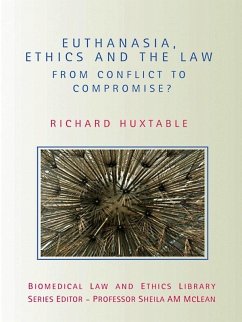
Euthanasia, Death with Dignity and the Law (eBook, PDF)

PAYBACK Punkte
35 °P sammeln!
Many advocates of euthanasia consider the criminal law to be an inappropriate medium to adjudicate the profound ethical and humanitarian dilemmas associated with end of life decisions. 'Euthanasia,Death with Dignity and the Law' examines the legal response to euthanasia and end of life decisions and considers whether legal reform is an appropriate response to calls for euthanasia to be more readily available as a mechanism for providing death with dignity. Through an analysis of consent to treatment, living wills and autonomous medical decision making, euthanasia is carefully located within it...
Many advocates of euthanasia consider the criminal law to be an inappropriate medium to adjudicate the profound ethical and humanitarian dilemmas associated with end of life decisions. 'Euthanasia,Death with Dignity and the Law' examines the legal response to euthanasia and end of life decisions and considers whether legal reform is an appropriate response to calls for euthanasia to be more readily available as a mechanism for providing death with dignity. Through an analysis of consent to treatment, living wills and autonomous medical decision making, euthanasia is carefully located within its legal, medical, and social contexts. This book focuses on the impact of euthanasia on the dignity of both the recipient and the practitioner while emphasising the legal, professional, and ethical implications of euthanasia and its significance for the exercise of clinical discretion. It will provide a valuable addition to the euthanasia debate.













